Currently, the need to seamlessly transfer data between Android devices has become more prevalent than ever. With a myriad of wireless transfer options available, users often find themselves navigating through a maze of choices. Whether you're upgrading to a new Android device, sharing files with a friend, or simply backing up your data, the convenience of wireless transfers cannot be overstated. In this guide, we explore 8 methods to transfer data from Android to Android wirelessly, providing you with a diverse toolkit for your data migration needs without the hassle of cables.

Samsung Data Transfer provides not only a stable USB connection but also a wireless transmission between Android devices. Even though it is named Samsung Data Transfer, it supports various Android phones and tablets with no brand restrictions, including Samsung, Honor, Sony, OnePlus, Vivo, Motorola, Realme, OPPO, Tecno, etc. Furthermore, it is widely compatible with most Android OSes, ranging from Android 4.0 to the latest.
- Wi-Fi and USB transmission modes are supported for Android to Android transfer.
- Support transferring multiple file types, including contacts, call logs, videos, music, photos, apps, SMS, etc.
- The transfer from iPhone to Android and vice versa are available.
- Won't damage file quality or change file formats.
- There is no ad on the user interface.
Download the mobile device transfer tool.
Step 1: Install the software on your computer, and click "Mobile Transfer". Ensure both Android phones and the computer are connected to the same Wi-Fi network.
Step 2: Click the "Troubleshooting or Wi-Fi connection?" icon, and tap "Connect via Wi-Fi". Then tap "Allow access" if prompted on the desktop. Then open the Android Assistant app on your phone, and use it to scan the QR code to establish the connection.
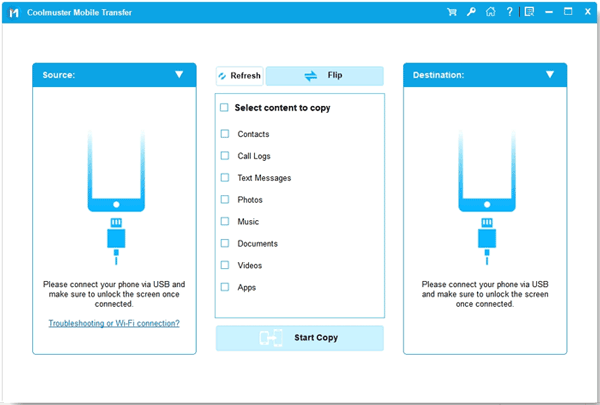
Step 3: Confirm your phones' locations, or click "Flip" to change. Then select the file types on the panel, and tap "Start Copy" to transfer data wirelessly.
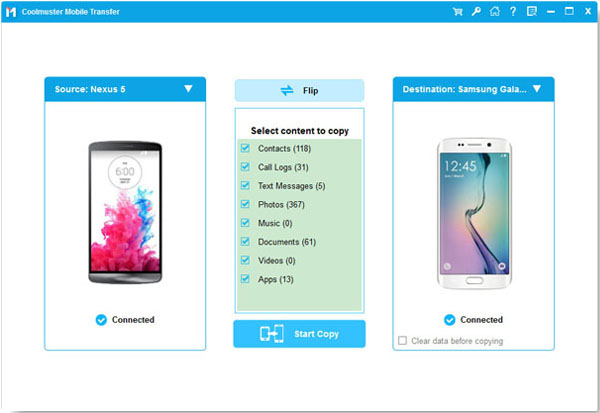
See more: How can you transfer photos from Android to Mac without a cable? Try these 6 methods.
In the second segment of our exploration, we dive into the familiar waters of Bluetooth technology. A ubiquitous feature in smartphones, Bluetooth provides a convenient and wireless solution for transferring files between Android devices.
Step 1: Scroll down the home screen, and enable "Bluetooth" on both Android devices.
Step 2: Then choose your Android device on the list to pair it to another Android phone.
Step 3: Once done, navigate to File Manager, and locate the files that you want to send. Long-press one file, and click "Share" > "Bluetooth". Then choose the other Android device, and choose "Accept" on it. The files will be sent to the target device via Bluetooth.
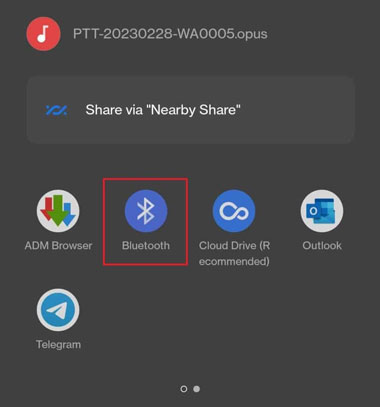
Read also: Easily Connect Android Phone to PC Using Wi-Fi
Samsung's Smart Switch takes the center stage in this part, offering users a comprehensive solution for data migration. Whether you're switching to a new Samsung device or simply seeking a reliable wireless transfer method, Smart Switch proves to be a valuable asset. However, it requires that the destination device is a Samsung Galaxy.
Step 1: Install Smart Switch Mobile on both Android phones, and open it. Then click "Send data" on the source phone and "Receive data" on the receiver.
Step 2: Choose "Galaxy/Android" > "Wireless", and make sure both devices are linked to the same network. Then tap "Allow", and the connection will be built.
Step 3: Choose the files that you want to send, and click "Transfer" to start the process. Then the app will send your data to the receiver without a wire.
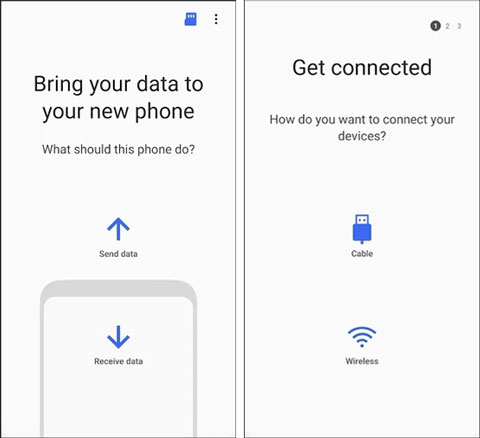
Google's Switch to Pixel service takes the spotlight in this segment, emphasizing the seamless transition between Android devices. Tailored for those making the switch to Pixel phones, this wireless transfer method ensures that your data, apps, and settings move effortlessly to your new device.
Step 1: Power on your new Android phone, and click "Get Started". Then unlock your old Android phone and place it beside the new one.
Step 2: Click "Set up" on the sender, and use the source device to scan the QR code on the receiver. Then continue to set up your new phone. Your active Wi-Fi connections will be transferred to the new phone.
![]()
Step 3: Set up the fingerprint lock and PIN. After that, please select the content that you want and hit "Copy" on the receiver. Your data will be imported to the new Android device with the available network.
![]()
This part introduces the versatility of third-party apps, focusing on Send Anywhere as a potent tool for wireless data transfer for Android devices, and guides you through the steps of using Send Anywhere, highlighting its cross-platform compatibility and efficient file transfer capabilities. Unleash the potential of third-party apps as we explore the convenience of Send Anywhere in moving your data between Android devices.
Step 1: Download and install Send Anywhere on both Android phones. Run it, and select the data on the sender.
Step 2: Tap "Send" to get a digital key. Then turn to your destination Android device, and click "Receive".
Step 3: Enter the key to the receiver, and the files will be sent to this device immediately.
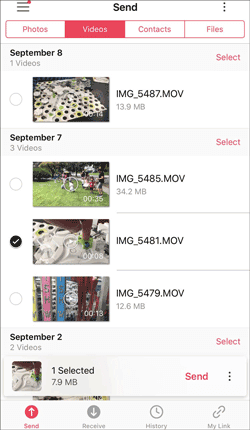
Further reading: Does Smart Switch require Wi-Fi? Let's find out the answer.
Google's Nearby Share takes the spotlight in this part, offering a modern and convenient way to share files between Android devices. This section explores the simplicity of Nearby Share, emphasizing its ability to facilitate wireless file transfers without the need for cables.
Step 1: Please swipe down the notification panel, find "Nearby Share", and enable it. Then tap "Turn on".
Step 2: Click "OK" to enable the "Location" feature, and select "Everyone" for device visibility.
Step 3: Go to File Manager, and choose a file that you want to send. Next, click "Share" > "Nearby Share".
Step 4: The sender will look for nearby devices. Make sure you have enabled this feature on your other Android device. As the device appears, click it, and tap "Accept" on the receiver. Then the transfer will be successful.

By syncing your Google Account across devices, you can effortlessly transfer contacts, calendar events, app data, etc. This segment explores the power of Google Account synchronization, providing you with insights into the seamless transfer of essential data between Android devices.
Step 1: First of all, please back up your source phone's data to your Google account. So, open the Settings app, and choose "Accounts and backup" > "Back up data". Then click "Turn on" > "Back up now".

Step 2: To sync the Google backup data to another Android device, you should reset the device in advance.
Step 3: Then set up the target Android phone, and sign in with your Google account. Continue to set up your phone.
Step 4: Choose "A backup from the cloud" when getting to the "Bring your data from" screen. Then choose a backup file, and select the desired content.
Step 5: Click "Restore" to sync the data to the target mobile device. By the way, during the process, please stay connected to the Internet.
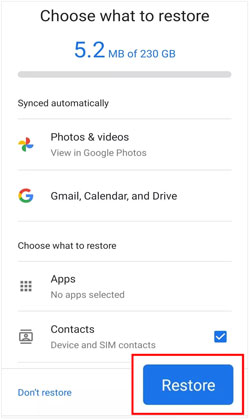
Near Field Communication (NFC) showcases its capabilities in enabling wireless data transfer with a simple touch. We explore the advantages of NFC, its applications in transferring data between Android devices, and the steps to initiate a smooth and secure transfer. However, Android Beam is no longer available on new Android devices.
Step 1: Enable NFC on both devices: scroll down the screen, and turn on "NFC".
Step 2: Navigate to the file that you plan to send to your sender, and tap "Share" > "Android Beam".
Step 3: Place both mobile devices back to back, and there is a pop-up on the receiver. After a while, the file will be saved to your receiver.
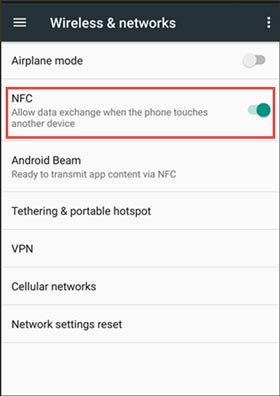
Q1: What is wireless transfer technology?
Wireless transfer technology refers to the methods and technologies used to transmit data between devices without the need for physical cables or connectors. This technology allows for the wireless exchange of information, such as files, documents, multimedia content, and more, between devices like smartphones, tablets, laptops, and other compatible gadgets. Some common wireless transfer technologies include:
Q2: Is there a limit to the size of files I can transfer wirelessly between Android devices?
The file size limit for wireless data transfer between Android devices depends on the specific method you are using. Generally speaking, the transfer method has no limit on the file size, but the transfer speed will be affected by the file size.
Q3: Are there precautions I should take before transferring data wirelessly?
Certainly, taking precautions before transferring data wirelessly between Android devices is essential to ensure a smooth and secure process. Here are some precautions to consider:
As we close this comprehensive journey through the realms of wireless data transfer for Android devices, it's evident that technology has presented us with a spectrum of options catering to diverse needs. From the one-click option like Samsung Data Transfer, brand-specific tools like Smart Switch, Switch to Pixel, to the universal appeal of Bluetooth, third-party apps, and Google's integrated services, the power to move data wirelessly between Android devices lies at our fingertips.
Related Articles
A Complete Guide: How to Transfer Data from Mi to Vivo - 6 Approaches
Seamless Switching: How to Change Apple ID Without Losing Data
Fast Transfer Data from iPhone to iPhone - A Full Guide
Move Data from Samsung to Lenovo Phone with 4 Fabulous Approaches
Phone Cloning Software Guide: 8 Practical Options to Clone Phone Data Easily
Delete Duplicate Contacts in Android Smoothly | 5 Ways [Updated]
Copyright © samsung-messages-backup.com All Rights Reserved.